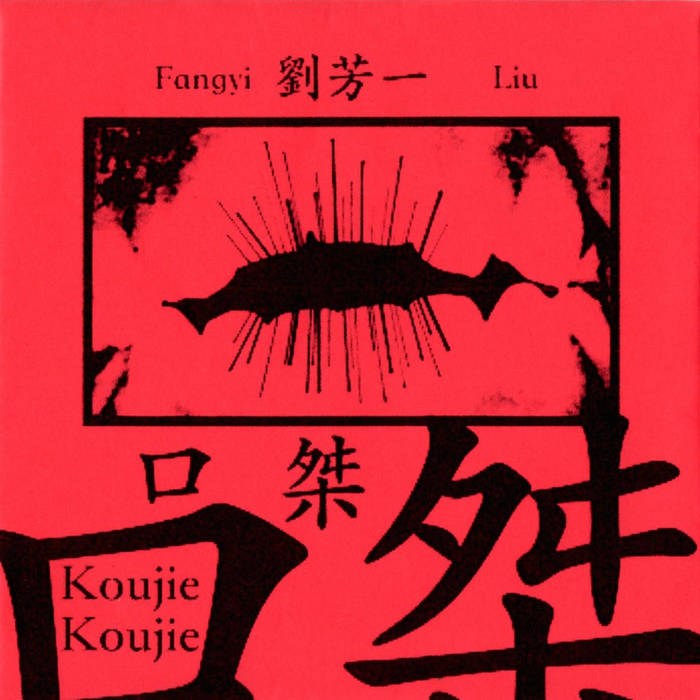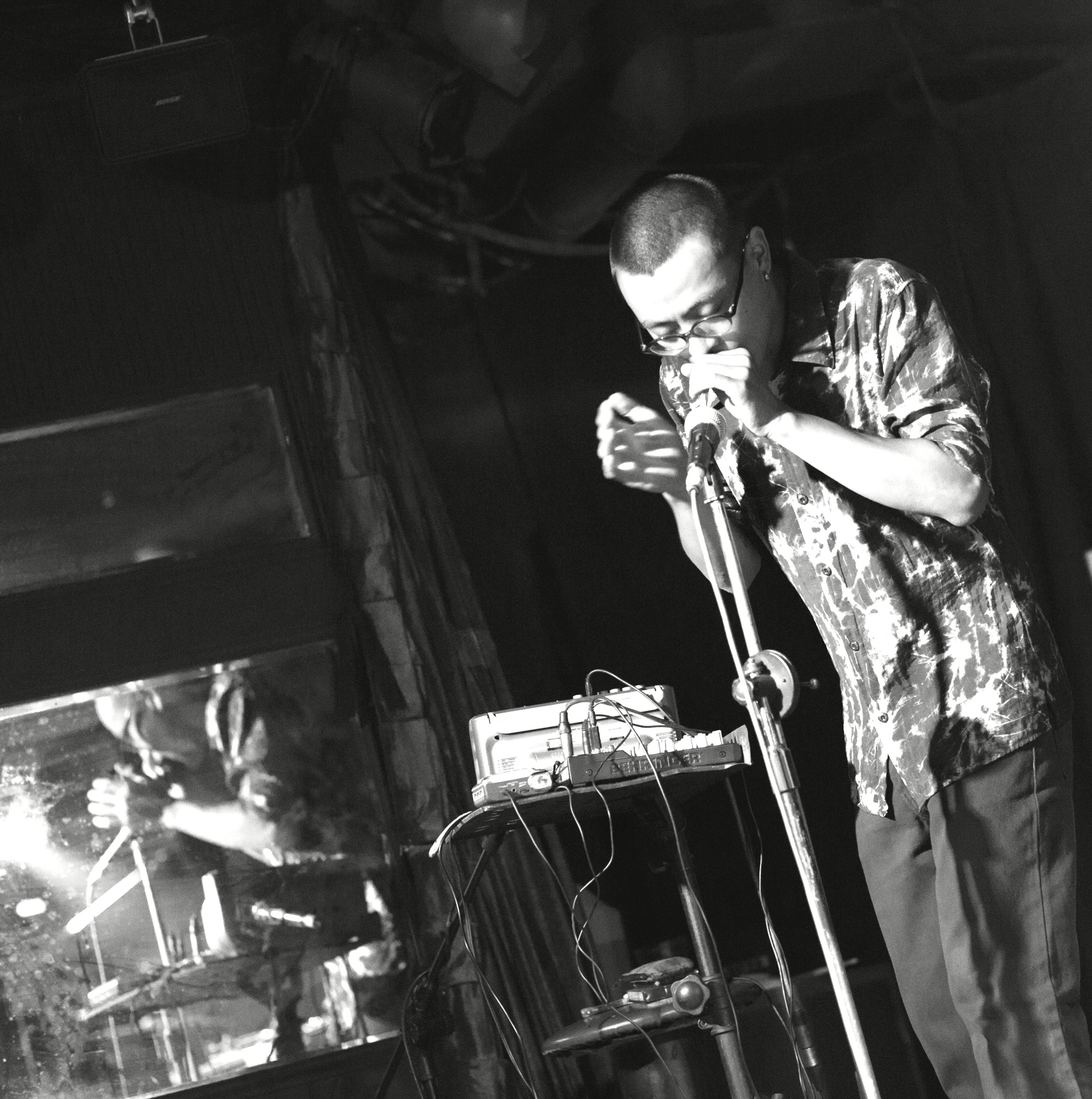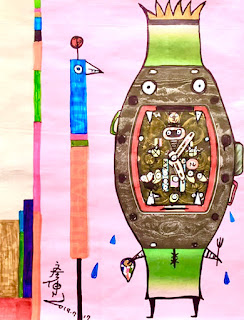Fangyi Liu: Koujie Koujie
 Navel-Gazers #27 is an interview with Fangyi Liu who is going to talk to us about Koujie Koujie. Every once in a while I encounter an artist who is totally unique and distinctive, and yet if I were to explain why that is, it's hard to say. The most obvious characteristic is Fangyi's voice: it's at the center of this music - in fact it's not always clear which sounds are vocal and which ones aren't, so that the whole production comes across as something of a "speech-scape" even though there are other sounds in the mix. And there's a certain textural quality to the recording as well - it often sounds analog rather than digital. I'm guessing it's a mix of both. But the real mark of distinction when it comes to 'Koujie Koujie', along with Fangyi's other work, is what another listener described to me as "undefinable" - it's some sort of energy, as though the sounds we're hearing on this record, the artist was utterly determined to put there, like it could never be otherwise. And although he's clearly plugged into the scene in Kaohsiung, Taiwan - which I can't wait to ask him about - his music almost resembles the work of someone who'd never heard experimental music, and maybe just discovered it on his own, digging around in the dirt... So how did Fangyi discover these sounds?? Only one way to find out...
Navel-Gazers #27 is an interview with Fangyi Liu who is going to talk to us about Koujie Koujie. Every once in a while I encounter an artist who is totally unique and distinctive, and yet if I were to explain why that is, it's hard to say. The most obvious characteristic is Fangyi's voice: it's at the center of this music - in fact it's not always clear which sounds are vocal and which ones aren't, so that the whole production comes across as something of a "speech-scape" even though there are other sounds in the mix. And there's a certain textural quality to the recording as well - it often sounds analog rather than digital. I'm guessing it's a mix of both. But the real mark of distinction when it comes to 'Koujie Koujie', along with Fangyi's other work, is what another listener described to me as "undefinable" - it's some sort of energy, as though the sounds we're hearing on this record, the artist was utterly determined to put there, like it could never be otherwise. And although he's clearly plugged into the scene in Kaohsiung, Taiwan - which I can't wait to ask him about - his music almost resembles the work of someone who'd never heard experimental music, and maybe just discovered it on his own, digging around in the dirt... So how did Fangyi discover these sounds?? Only one way to find out...AC: Thanks for joining me Fangyi! So in these discussions, I always try to start at the beginning and it looks like in your case, maybe 'Koujie Koujie' was towards the beginning? It's the earliest album on your Bandcamp.. why don't you tell us about your background and how you got started.
Fangyi Liu: Firstly, I’m glad you contacted me to talk about this album. Talking about 'Koujie Koujie' is a bit like opening a teenage diary. You must face some embarrassing and private emotions. Having someone to accompany me will increase my courage, but I do hope to share it with others.
I started creating and performing in 2012. The reason in the beginning was that I met some friends who were involved with experimental music. Through them and through the internet, I came into contact with various types of works such as field recording, free improvisation, and modern music. Those sounds fascinated me, and at that time I thought that even though I don't have any instrumental musical ability, I could try to make that kind of music, so long as I combine interesting sounds.
This idea may come from experimental music which reminds me of modern art or contemporary art. It is also abstract, uses a variety of materials, allows for indescribable emotions, is full of expressive possibilities, is free and has many changes. And my view on art creation has always been that anyone can start creating immediately without the need for professional training in the academy. My parents were outsider artists, and I was taught this concept since I was a kid.
In order to create, I bought a zoom h2 recorder, I recorded all the sounds I heard and the sounds which I used to improvise with objects, and then used Audacity to arrange and cut the combinations, which is very similar to how I used software to edit videos in high school. Now I still use the same method to create. Sometimes I call my creations sound collage. Combining sounds of different origins and times and spaces into a narrative is one of the foundations of my creation. These combinations can produce new meanings, and new forms of hearing. That’s why I love concrete music very much. In high school screenwriting class, the teacher let us listen to concrete music works with our eyes closed. After listening, we had to write an imaginary plot for the sound we heard (but I didn’t know what I was hearing at that time, and I didn’t have a concept of concrete music).
AC: Your parents were both outsider artists! Now that is interesting, could you tell us more about it?
Do you remember now what concrete music it was that the teacher played for you? And what was your imaginary plot?
Fangyi Liu: Let’s start with my parents being outsider artists. They were business professionals when I was in elementary school and weren’t creating anything then. At that time, they asked me and my sister to study pottery in an artist’s studio. It was said to be pottery but it wasn’t really… you were either making a container, or squeezing something out of clay. Later my parents joined in, and then began to try painting, and they continue to this day. I’ve attached some of their works if you’re interested. Although there is a famous outsider artist Hung Tung in Taiwan, the discussion and research on outsider art is very limited. I particularly like the creations of outsider artists. Many of these creations are connected through their unique sensibility and aesthetics. This unique world of creators, many of them unimaginable and incomprehensible, fascinates me.
Because it has been more than ten years, I’ve mostly forgotten the details of the class at that time, even the name of the teacher, but the series of voices in the clip seemed to be constantly going by, as though I could not grasp the plot. Like movie clips, except you can’t see the feeling of the picture. Therefore, sound (not music) is no longer a by-product, attached to events or visions, but a subject that grasps (with eyes closed) our attention. The unexpected experience left that lesson in my memory.
AC: You mentioned that there were voices in the concrete piece, and they’re a very distinctive feature of your work too. Could you explain your approach to the human voice on tracks such as light and untitled? Are you a person who is comfortable with verbal communication or conventional singing?
Fangyi Liu: 'light' uses a poetic text, which was created for the publication of a poem by a friend of a friend, so I selected this section that I particularly like from the poem. The content of the poem describes the working state of natural things… Regarding time, life (the growth of living things), and death. I like the world described in this poem, in which there are no human beings, or where human beings are equally affected by time as non-human beings. Therefore, I was motivated to create a poem in which humans seem to be absent. Most of the voices are composed of human voices, which pleases me. However, when I make and process these human voices, I imagine that these sounds could be made by non-human beings. It reminds people of life in the shadows or the growth of plants. When making these sounds, I tend to make some smaller or more physiologically more intimate sounds. Sounds that only I can hear. I make these sounds while monitoring the recording, so that I can perceive them the fastest and control the texture of the sound, but after these premises are set, all that is left is to improvise the recording of human voices.
The creation of these sounds during improvisation is half by intuition and feeling, or subconsciousness. It should be evident that 'light' is an arrangement of improvised sounds through Audacity, which involves using reverb or rewind to change the time or space state of the human voice, and 'untitled' is a completely unprocessed vocal improvisation recording. I used a piece of discarded silicone I picked up to make a human-like exhalation or a sound which wet lips might make. At the same time, I used my own voice. The vocal duo is also a bit like operating an inhuman puppet.
There is another concept in performance, which is soft noise. It is more common to use metal objects to make noise music… I was just thinking, is it possible to use soft objects with completely opposite properties? I should continue to experiment with this idea.
The original poem 光線 "Light" by 零雨 (Yu Ling):
光線掉落在樹葉尖 / Light falls on the tip of the leaves
光線掉落在淪波上 / The light falls on the wave
都是立體的 / All three-dimensional
遠古以來的眾生物 / All creatures since ancient times
掉落 掉落 掉落 / Falling falling falling
陰影裏面的光線 / The light in the shadow
如何生存變化 / How to survive change
交相傳遞 / Intersecting
枝條如何伸直彎曲 / How the branches straighten and bend
向泥土或向天空 / Towards the earth or towards the sky
果實如何轉綠 / How the fruit turns green
轉黃而不發出 / Turns yellow without sending out
一點聲響 / A little noise
礫石上的綠苔如何 / How about the green moss on the gravel
灑下又滾落 / Sprinkled and rolled down
去到更深處 / Go to a deeper place
I am not a person who is used to verbal communication or singing. I can hardly sing, because I can never remember the lyrics and I lack intonation, so I am more used to improvising and singing in non-existent languages, such as fake English or Japanese, instead of following standard songs, and I’ll sing in such a way that there will be no question of whether the pitch is correct or not. I also like to imitate the radio, that is, switching to different styles of songs, conversations and even noise at any time. After I started listening to experimental music, I began to try all different kinds of vocal performances. This happens when I am alone. Like my own game, I play it while riding a motorcycle or taking a shower. Sometimes I wonder if other motorcyclists or pedestrians on the road hear it? Another fact is that I don’t like my own voice very much. I was very late to realize that my voice heard by others is different to what I heard myself. The difference makes it very difficult for me to adapt. But improvising with the human voice, I can hear the same (or at least close to) what others hear through the microphone and speaker, so I can exert more control to express the sound I want.
AC: You mentioned that the exposure to outsider art is limited in Taiwan, but really this is true of all outsider art, by definition! I’m pleased to know that such a concept exists over there. I wonder if you could tell us about the broader culture of experimental art in Taiwan, and particularly Kaohsiung, how that might differ from Taipei, or Taichung? You seem to know some other artists, how did you meet them?
Fangyi Liu: Most of Taiwan’s experimental music or sound art related things take place in Taipei (Taipei City & New Taipei City), where the population is several times that of other cities, and there are concentrated major art academies and institutions, galleries and art museums. In Taiwan, an interesting phenomenon is that curators, creators, and researchers of contemporary art are more interested in experimental music than in other fields. Nowadays, the media often uses the concept of sound art to present all sound creations, so the general public has access to experimental music opportunities. Most of them are in contemporary art-related exhibitions or events, but I think that the real vibrant sounds are mostly produced in underground scenes. Regarding the artists and scenes in Taipei and other cities, and the development of Taiwan’s experimental music movement, you can refer to Jyun-Ao Caesar who wrote an article for LaoBan Records in Kuala Lumpur.
The situation in Taichung is similar to that in Kaohsiung, with only a very small number of experimental musicians, turntablist DJ REX and the self-taught free-jazz saxophonist Xiao Liu… Taiwan's legendary painter Jun-Yang Li now also plays with them (Buddha Tiger Dog Trio).
In Kaohsiung now we have a small group Be Ni Ya Ben (Japanese for ‘plywood’), the members include me, Gu Huan-Zhang (a.k.a Runner), Yu-Chiao Yang, Hsiangyu Ku, Qin Yi Chen, Chen En He. We often have sessions and workshops, both of which are held in the record store "Bardo Pond" operated by Runner (this is a tribute to the band of the same name, you may have heard of them). Runner was one of the leaders when I started to get in touch with experimental music. He had an electronic noise improvisation group BRC with Car5on. It was when I saw their performance for the first time, that I realized music could be completely improvised. Later, I with him and Hsieh Feng Chen (a sound artist, she moved to Hsinchu after her marriage) set up the online community "Cochlea" together, held the experimental music series Cochlea Gigs, and then met Hsiangyu Ku, Qin Yi Chen, and Chen En He through the Cochlea Gigs event. Some of the people from this group also have their own group, ИЗОЛЕНТА³.
Yu-Chiao Yang is special. He emigrated from Taipei to Kaohsiung. He is a researcher in multiple disciplines (folk tales, animation history, narratology), poet and baroque music singer. He has some quite special projects, such as recitation of folk tales. He has one work where he responds to Lucretius's book De Rerum Natura with field recordings and fixed-lens films.. and he also runs a series of experimental music shows called Anamorphosis & Anatexis. I’m very happy that experimental music in Kaohsiung is gradually coalescing into a scene now where there are more possibilities than in the past.
AC: Of course I know Bardo Pond (the band), I used to live in Philadelphia! but it’s funny, our last few Navel-Gazers have been from far corners of the world… so now I’ve got several responses to this question and a growing list of music to check out. Thanks for the name-drops!
Actually it was Qin Yi Chen who recommended I speak to you and I’m grateful for that, the discussion has been especially thought provoking.
What’s next for you Fangyi? What direction are you going with your work? Do you have any final thoughts you’d like to share with our readers?
Fangyi Liu: What is certain is that 2022 will be busier than 2021. Chen En He and I just finished a theater soundtrack work, about a surrealist script, but we are not very satisfied with the results, so we may re-use the material to create a version that we like better.
In addition, he and I will record a duet album to be released by an Italian tape label that we all love very much. It should be quiet, full of various textures, and keep a proper distance from the listener.
I hope that in 2022 I can do more interesting things with the members of 'Be Ni Ya Ben' and start planning performances again.
AC: Nice. Thanks for this discussion Fangyi!








